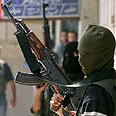
The Palestinian failure
Palestinian Authority chaos prime example of a failed state
There are not many governments in the world that include 10 members who have a doctorate from the finest American universities, three physicians, three engineers and one attorney. Indeed, the artificial pressure exerted by the West for "reforms and changes" in the Territories led to the establishment of an "impressive Palestinian government."
However, this government with all its impressive intellectuals is a "spoof government" as it hides behind the backs of terror gangs, lends a hand to emotionally blackmailing the Israeli public (the Gilad Shalit affair) and is indifferent to social changes and to security related initiatives and reforms. This is a prime example of a failed state.
In July 2004, close to its 228th independence day, the US State Department opened the Office of the Coordinator for Reconstruction and Stabilization (S/CRS.) Its official mandate is to help stabilize and reconstruct failed states. Carlos Pascual, the appointed coordinator, explained then that failed states pose a strategic threat to the Western world, including the US, and more than the US seeks their stabilization, it is seeking its own wellbeing by aiding them - "Its own wellbeing", not the wellbeing of the failed states, and certainly not the wellbeing of its neighbors.
Condoleezza Rice's last "litmus test," as well as the updated version of the Road Map are not the symptoms of aiding failed states, but rather, serve to create them. Declaring the removal of checkpoints and opening of crossings in total disregard of the security problems prevalent in the Territories is a classic example of the US Administration's twilight days' "lame duck" policy. Decisions of this nature only add Palestine to the American Administration's long list, which shows that between 1955 and 2000, 114 failed states threatened world peace.
Abyss of terror
A failed state can be identified in three ways: The central ruling power's struggle against revolutionaries, instability, and religious conflict and massacre of opponents or minorities. The Palestinians went a step further by becoming a failed state even before the Palestinian Authority became a state. Some 40 armed groups engage in kidnappings and assassinations, burn down shops, and threaten the international media everyday - yet for Condoleezza Rice the most burning issue is the checkpoint at the village of Idna.
I have often heard the joke in the US explaining the similarities and the differences between Israel and Palestine. The two states, they say, were founded "bit by bit," through disorder, chaos and years of improvisation. However, the difference is in that it was exceptionally successful for the Jews, they explain.
When Palestinian intellectuals in the US are seriously asked to explain how after 60 years of conflict, Israel has a space satellite, a series of Nobel Prize laureates for significant scientific achievements and an economy that thrives even during wartime, while the only Palestinian scientific achievement is the Qassam rocket, they respond: "Give us a state and we'll be able to do the same."
In the mid 1990s Arafat was granted a state and he proceeded to lead it to the abyss of terror and chaos his successor, Mahmoud Abbas, is finding it difficult to extract itself from. This is how it is: When a atate is founded it usually becomes a success, but when a state is handed over – it is destined to fail.
Moshe Elad is a researcher at Shmuel Neeman Institute at the Technion










